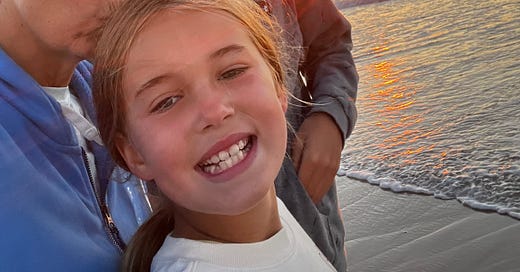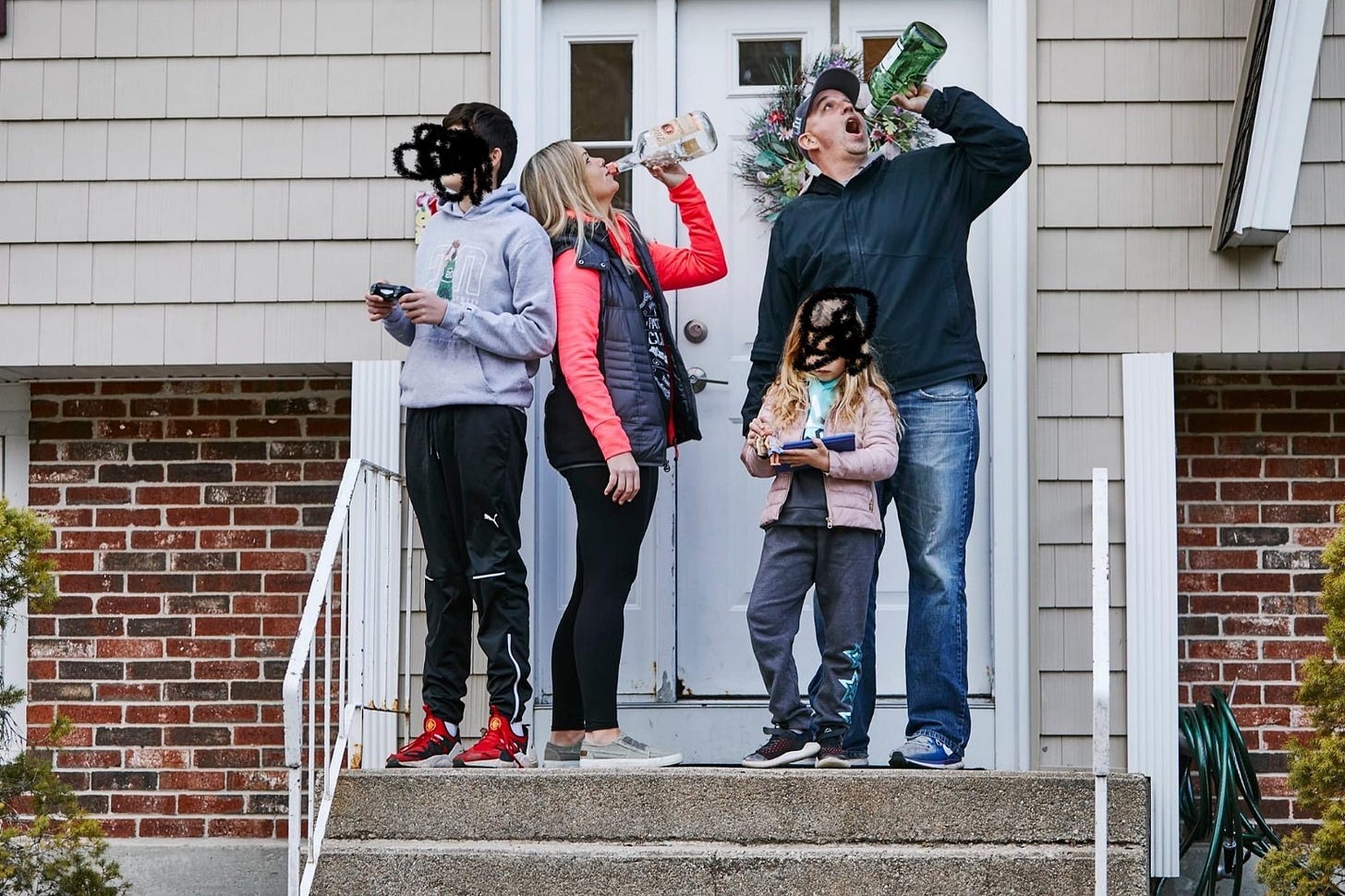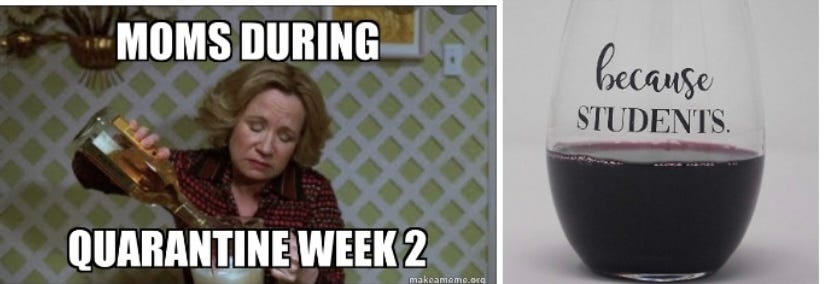In 2021, I untangled myself from alcohol. Prior to that, my dance with drinking had become a nightly tango. The steps were automatic, the choreography my own.
Ice tumbling into my glass mere minutes after walking through the door was the only thing that helped me exhale. Just hearing the sound made my shoulders relax and drop down from my ears. I made it through the day. Here comes my reward.
It hurts to write this, but at the end of most days, I reached for a drink before going in for a hug from my kids.
My biggest take away since exiting that dance floor is this: I never knew what I was missing. And I was missing so much.
Alcohol is a central nervous system depressant. Getting and staying sober is how I was able to truly reward myself. The prize on the other side: reclamation of self.
Moms need help and resources. Not another meme, glass, or t-shirt that tells our kids they are the reason we drink. I say this with zero judgement, because this was me:
A local photographer captured this photo of my family during lockdown in the pandemic days. We participated in a fundraiser where all proceeds from porch photo shoots (done with social distancing) went to local small businesses forced to shut down due to Covid.
My husband and I thought it would be hilarious to showcase how we were spending our time in lockdown. Yes, that’s a handle of Tito’s and Tanqueray in our hands. That was how we managed during the days of being locked at home with our children and work.
We drank to cope. Our kids had a front row seat.
To escape stress, many moms bottle up their emotions as they uncork the bottle. They drink a glass or two to check out. The habit of drinking as a reward or coping mechanism is a path to self-abandonment.
This may be harsh, but I’ll say it: Not only are you abandoning yourself in the process. You are abandoning your kids.
You may be right there in the same room with them, but you’re displaced from them. Your mind is fixated on: Do I go for a second glass? Or: I’m just going to slip into the kitchen for a refill.
Back in 2020, scrolling past these memes, I felt seen and understood. It reinforced the message that everyone else was drinking their way through this mess too. It was just the kind of fuel that my addiction needed to grow. Call it the manure that fertilized my alcohol dependency.
I wasn’t alone. Drinking among women went up 41 percent during Covid.1 Among mothers of kids under 5, drinking went up 323 percent!!!!2 Prior to the pandemic, alcohol-related deaths typically increased 2 percent a year. In the two years after Covid began, they went up 25 percent!3
I could go on, spit out more bleak statistics, and write through my frustrations at Big Alcohol for how they market towards women in the same way Big Tobacco did decades ago. Not to mention the links between alcohol consumption and cancer.
I want to scream from the rafters that there’s no such thing as clean wine! Stop it, Cameron Diaz! No matter how pink you paint it, no amount of ethanol is clean or organic. But I’ll stop there and return to the topic at hand.
Parenting While Drinking vs. Parenting Sober
Let me tell you about the big changes I see as I parent my kids with a sober lens.
Looking back now, I am grateful for the pandemic because it was the catalyst in opening my eyes to the magnitude of my dependence on alcohol.
What I needed back then was not a central nervous system depressant. I needed the opposite. I needed to dry out from alcohol so that my nervous system could communicate with me. I needed it to come back to life and flip back on so that I could feel my body signaling to me. It was as though everything was short circuited. The motherboard was fried.
When I got some traction and the sober days started to pile up, that motherboard didn’t just turn back on. It lit up and woke me up to all I was missing.
If your drinking-to-cope habit makes you feel jagged inside. I understand. That was me for so long. If reading this is stirring up something inside you, a knot of nots in your stomach, let it. Let yourself feel that sensation.
The next time you go to pour a drink so that you can turn away from the hard, try this: Instead of sipping to numb, let the hard visit you. Rather than pour the drink to drown things out, pour out you.
That might mean tears fall. Let them. They won’t last forever. Do something else instead.
When you’re feeling torn, tear out a page of paper and pour your insides there. Use the time to figure out what alcohol is covering up. Is it that your partner needs to offer more support at home? Do you need to set a boundary and have a hard conversation with someone? Is that ticker list of what needs doing on repeat in your head like it was mine? And all you want to do is quiet it down? Is it that you need a better work-life balance?
I used alcohol as an escape route from myself. I would drink to quiet my mind—the relentless chatter that spoke in a tongue full of anxiety and expectation.
The thing is, you can’t excavate any of that if you keep pouring and drowning out your pain, worries, and fears. By paying attention to the stirrings inside you, you’ll come alive. Consider sobriety a life raft.
Sobriety is a lot like parenting in that you really can’t understand the magnitude of what it feels like until you’re living it.
People will tell you there is no other love like the one you have for your child but, until you hold that baby in your arms for the first time, you don’t really understand. Once it happens and you land there, “Ah, this is it. This is what all the hype is about.”
Sobriety is the same. You don’t know how life changing it is until you get here. I feel like I am always trying to sell something to people who approach me with curiosity about not drinking. You have to really step into it, day after day, to know how it will change you.
As for parenting in my drinking years, I can tell you all about the regrets and shame that I carry over my kids having seen me habitually tipsy or drunk, or overhearing my spouse and I arguing in a booze-infused fight.
But honestly, the part of my heart that hurts the most when I think about all the years lost to drinking is the lack of presence that I had in the everyday moments. Sobriety has this magical way of waking you up to the world.
So often I think, what did I potentially miss when my daughter was four and starry eyed while I was glassy eyed? Now that I know what I can witness in one day of being open and alive with the clarity that sober living brings, my only regret is that I didn’t quit drinking sooner.
I’m in my fourth year of sobriety and I STILL get huge waves of gratitude that spill over me when I collect the nuggets of gold sober evenings bring.
There is the lingering bedtime chatter and giggles with my 10-year-old daughter. There is recognition of how I no longer rush through it because my mind is not hijacked by my cocktail that is sitting on the kitchen table waiting for my return.
Or the moment my 16-year-old son jumps on my bed beside me, asking, “Whatcha reading Mom?” which dovetails into a long discussion over his American studies class and colonization. This would have been lost on me or blurred during the drinking nights. And I would not have had a book in my hand.
What I’ve learned is that kids disclose things at night. Before they shut their eyes for the day, they want to share their hearts, their hurts, and their mixed minds with you. And when your mind is altered by alcohol, it won’t be open enough to receive it. You’ll miss these opportunities.
There is no casting shame here—just understanding. I missed so many moments like these for years, because I structured my nightly routine for me. My reward. My unwinding.
In doing so, I built a wall between my kids and me. It wasn’t so tall that they couldn’t see me—I was still there. But I had my side and they had theirs. It was more like a chain link fence. There’s mom but she’s not really accessible. I can see and hear her, but she’s still not here on my side. And I’m afraid to jump the fence and be on her side because when I do that, it’s unpredictable.
Our kids deserve to be on the same side as us. There’s such freedom without that fence. Break through those chains. Return to yourself and your family.
Your turn!
We’d love for you to share in the comments:
Does your sobriety impact how you show up as a parent?
What changed about parenting once you got sober?
And if you found this article helpful, please tap the little heart. It lets others know there’s something useful here and will help us grow this community.
Want to be published on Sober.com? If you’re a sober writer, we invite you to contribute! Reach out to hello@danaleighlyons.com for details.
Women, alcohol, and COVID-19 (Harvard Health Publishing).
Alcohol-related deaths, which increased during the first year of the COVID-19 pandemic, continued to rise in 2021 (National Institute on Alcohol Abuse and Alcoholism, nih.gov).








Huge recognition and celebration of your path, Allison. I view parents who choose to get sober as heroes, offering a precious gift to themselves, their kids, and future generations.
I feel like my sobriety is breaking a generational cycle. My daughter is sober at 22, and even my mom was talking about deactivating her wine box subscription at Easter brunch where I noticed no mimosas were flowing for the first time I could remember. I have my fingers crossed that it’s going to stop showing up at our family gatherings. Even when it’s hard and painful, sobriety is a gift!